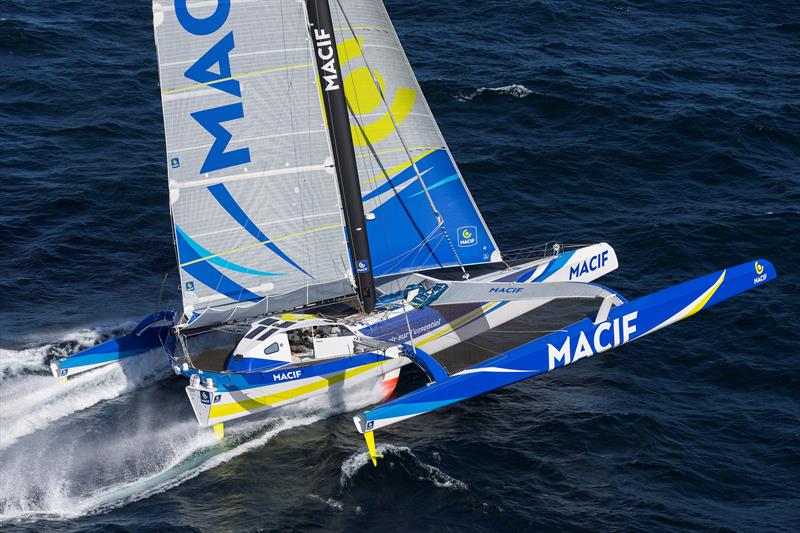
François Gabart, single-handed training on MACIF trimaran
by Trimaran MACIF 2 Apr 2016 14:50 BST
2 April 2016

François Gabart aboard the MACIF trimaran © Jean-Marie Liot / DPPI / Macif
Re-launched on 4 March in Lorient and delivered to its port of registry, Port-la-Forêt, immediately afterwards, the MACIF trimaran has been out sailing regularly this March. The goal for François Gabart, double-handed winner of last November's Transat Jacques Vabre, is to familiarize himself as quickly as possible with single-handed sailing on his 30-metre trimaran.
MACIF out sailing regularly
"Preparation time for the Transat is highly limited (prologue on 23 April in St Malo, start on 2 May from Plymouth), so my priority is to learn to control manoeuvres single-handed as best as possible, which is far from easy", said François Gabart. To achieve this, he has been working very hard, regularly training at a particularly intense rhythm: "For example, last week, we spent 18 hours in all sailing. I gybed five times, tacked five times and changed sails three times. I spent more than half of my time turning the cranks. It was hard work!" However, according to François you have to do this "to cleanly perform manoeuvres" and to be as confident as possible before the start of The Transat. The skipper was also able to confirm the winter refit optimisations during these sailing runs, in particular the extension of the protection cap. "I'm very happy with it. In terms of safety, it's a real plus to be in an area that is completely enclosed. It's also a real advantage for single-handed ocean sailing on a boat like this one."
Pascal Bidégorry helping
Similar to last year, François Gabart asked Pascal Bidégorry, with whom he won the Transat Jacques Vabre, to develop the MACIF trimaran with him. "Pascal is there for practically every sailing run, which means that we are constantly progressing in terms of performance. I focus primarily on manoeuvres and Pascal concentrates on the boat's speed and thinks about trimmings to make the quickest possible headway." Pascal also gives the MACIF skipper advice so that he will get his bearings on this trimaran: "He helps me break down manoeuvres, since he has experience in single-handed sailing on this type of boat and I do not. This brings me peace of mind and it is a privilege to able to rely on his expertise."
On a training course with Sodebo
On Wednesday, MACIF and Sodebo were taking part in a two-day training course organised by the Port-la-Forêt Offshore Racing Centre. On the programme: sailing around the Glénan and then 24 hours in racing mode in the Bay of Biscay, during which François Gabart and Thomas Coville will do their best to sail single-handed. They will be accompanied by a few crewmen, Christian Le Pape, the centre's manager, and Sébastien Col, the centre's trainer. "I have always thought that the best way to make progress is to compete with other sailors and share one's experiences. I am delighted to sail with Thomas, who will be one of my contenders during The Transat. It will be interesting to weigh up his boat against mine in racing conditions and I am eager to see how MACIF will behave in relation to Sodebo. We have both a great deal to learn about this type of sailing." After this course, François will continue to alternate day outings and offshore sailing runs until the start in St Malo on 20 April.
What is the purpose of having two sets of foils?
Since early March, the MACIF trimaran has been sailing with two foils. This is an opportunity for François Gabart to explain what makes these appendages useful: "Instead of the boat being supported in the water by a float, it is supported on the foil, which takes the weight of the structure, so that the boat rises above the water. This means that there is less surface area underwater and therefore less drag and greater speed. Another considerable advantage of the foil is that it stabilises the boat above the water, meaning it can pass over waves in certain weather conditions, instead of digging in. This gives you a fairly strong sense of safety." At what speed do the foils come into effect? "Above 16 knots, we use them all the time."
www.macifcourseaularge.com